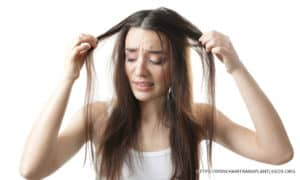Causes of Hair Loss in Women
 It is natural for women to lose around 100 hairs every day, but excessive loss of hair, especially in women, can be a symptom of an underlying problem in the body. Female Pattern Baldness, Telogen Effluvium, Anagen Effluvium, Alopecia Areata and Traction Alopecia are the most common types of hair loss in women and are a result of different underlying issues. In order to treat the issue of hair falling out, women need to know what is causing it.
It is natural for women to lose around 100 hairs every day, but excessive loss of hair, especially in women, can be a symptom of an underlying problem in the body. Female Pattern Baldness, Telogen Effluvium, Anagen Effluvium, Alopecia Areata and Traction Alopecia are the most common types of hair loss in women and are a result of different underlying issues. In order to treat the issue of hair falling out, women need to know what is causing it.
- Female Pattern Baldness or Androgenetic alopecia is due to the actions of various hormones and especially dihydrotestosterone (DHT), a product of the male hormone testosterone. Normally, women do not possess the hormone in quantities large enough to create hair loss, however, menopause and sometimes heredity from either of the parents may lead to thinning hair on the scalp and bald patches. Hormonal changes also cause the same type of hair loss after pregnancy and when some types of ovarian cysts occur.
- Telogen Effluvium, is also associated with hormones and especially with DHT. It is a short term reaction to a stressful event for the female body. This could be excessive dieting, child birth or extreme stress. Six weeks to three months after the event, hair loss occurs. Usually, the hair grows back even if not treated.
- Anagen Effluvium is hair loss because of chemotherapy. Chemotherapy targets rapidly dividing cells in the body, in order to destroy cancer cells. Because hair has the same quality, sometimes it is affected as well.
- Alopecia Areata is an autoimmune disease, which attacks hair follicles in the scalp area. This is also usually a hereditary disease.
- Traction Alopecia is the condition caused by the mistreating of hair with tight hairstyles, extensions and styling products.
Hair Loss Factors in Women
There are countless factors why women may experience hair loss. Anything from clinical problems to hormonal changes to stress and anxiety. It’s difficult to try and diagnose the root cause.
Here are some of the reasons why women experience hair loss:
- Age.
- Genetics.
- Radiation medication.
- Medical problems.
- Extreme hairstyling (hair shade, horse tails, braids).
- Usage of destructive chemicals on hair.
- Stress.
- Menopause.
Hair Loss Treatments for Women
Because hair loss sometimes has to do with hair mistreatment, often women with thinning hair tend to dismiss the problem. In some cases that is the right thing to do. However, if the problem persists for more than a couple of months it is recommended to seek a doctor’s opinion on what is causing it and how to treat it.
There are various hair loss treatments for women on the market ranging from shampoos to hair transplants. The treatment type of choice is dependent on the type of hair loss experienced, the type of treatment available, how effective it is going to be and budget.
The treatment that is usually suggested to most women is Minoxidil 2%. The treatment involves the application of the substance on the balding areas. Its results are not permanent and stop when the treatment is terminated. Common side-effects also include: burning or irritation of the eye, itching, redness or irritation at the treated area, as well as unwanted hair growth elsewhere on the body.
If hair loss is the result of malnutrition doctors may suggest taking iron supplements and when hormonal imbalance is to blame, spironolactone or oral contraceptives are prescribed.
In cases when hair loss is permanent, or a permanent solution to the hair loss problem is desired, hair transplants from healthy areas of the scalp can be used in order to cure hair loss in women.
Changing your hair regimen can only benefit your hair if the previous one was to blame for your hair loss. In that case it has been found that anti-dandruff shampoos that contain ketoconazole can slow it down.
To conclude, when facing persistent hair loss ask for your doctor’s advice and pick carefully your course of action. If your selected treatment is unsuccessful consult your doctor again because hair loss can be a sign of a vast number of undiscovered problems.
Patient Testimonials
Aside from achieving fantastic results, we believe that keeping in touch with our patients before, during and after their hair transplantation procedure is paramount – it helps to keep our patients feeling calm and in control. We’re always on hand to provide guidance, support and aftercare advice. Time and again, our patients tell us that this is what sets us apart from other clinics.
You can read our great reviews of FUE hair transplants over on Google and TrustPilot




